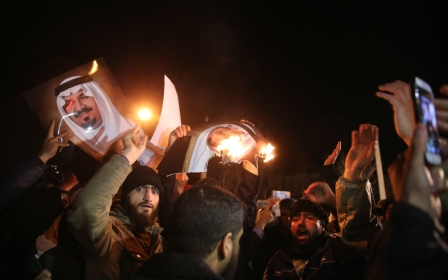The true roots of the Iran-Saudi spat

Within hours of his execution, the case of Saudi national and Shia opponent of the Saudi government, Sheikh Nimr al-Nimr, turned into a regional crisis that escalated the conflict between Iran and its foes in the Arab neighbourhood. Scores of Sunni Saudi nationals were executed at the same time, but the al-Nimr case illustrates how sectarian identity has turned into a force that permeates the Middle East.
Iran and its allies in the region, who organised protests against Saudi Arabia, were not distressed about the death sentence per se, nor about the scores of Sunni Saudis who were executed at the same time. They were also unconcerned about the legal process that led to the execution.
What prompted them to storm Saudi Arabia’s embassy in Tehran and its consulate in Mashhad was the execution of al-Nimr. Al-Nimr's Shia identity, which is not supposed to be anything other than marginal to his nationality as a Saudi citizen, became his fundamental identity, not only as far as Iran was concerned but also in Iraq and Lebanon.
The region is being shaken a fierce sectarian conflict that cannot be ignored.
Perhaps Iran bears the biggest share of responsibility for the increasing use of the sectarian card to achieve political aims. At least since the 1990s, Iran supported the process of transforming the discourse of the political forces opposed to the former regime in Iraq into a purely Shia discourse. It exerted considerable effort to generate Shia opposition groups, and purely Shia, to challenge the Gulf states that have Shia minorities.
And while there are many reasons behind the support Iran provides to Bashar al-Assad's Syrian government, it is hard to ignore the sectarian dimension behind this irrational commitment to the preservation of a despotic fascist regime that faces a revolution waged by the majority of its people.
The government of the Islamic Republic of Iran, which was born out of a major Islamic people's revolution and expressed itself in the beginning by means of a universal Islamic discourse, underwent a major transformation during the past few decades.
Just like all the states who boast a major historic legacy and who view themselves as having a regional role and an important position on the international stage, there is more than just one driver of Iranian foreign policy. One of them is universal Islamic affiliation. Another driver has to do with Iran's national and geopolitical interests. A third driver concerns Shia sectarian identity and the ambition to become the leading state for all Shias around the globe.
For reasons that may not be divulged at this juncture, it would seem that the universal Islamic driver retreated in a remarkable way following the end of the Iraq-Iran war, to be replaced, quite steadily, by geopolitical and sectarian ambitions.
Shia Muslims, with all their denominations, and Sunni Muslims, with all their denominations, came into existence as the specific concepts of each denomination were shaped in the third and fourth centuries after the birth of Islam. Being a Shia is one thing, and to consider the Shia affiliation the fundamental determinant of your political inclinations and your social position is something completely different.
Hundreds, perhaps even thousands, of young Shia men carried arms and fought within the ranks of the Fatah Movement and other PLO factions in the name of resistance and under the banner of goals relating to the freedom and independence of the Arabs. Today, there are thousands of other Lebanese Shia young men who carry arms in the name of resistance too, but with the objective of giving prominence and precedence to the sect.
Even in Iraq, it seems obvious that tens of thousands of young Shias who are recruited into the ranks of the Popular Mobilisation Forces are fighting principally with sectarian motives that are to do with the Shia hegemony over Iraq and its resources and not with the aim of liberating Iraq or preserving its national unity and independence.
These sectarian motivations are exactly the same ones that drive thousands of young Shia Iraqi men, as well as non-Iraqis, to fight in Syria against the Syrian people's revolution and its armed forces.
Yet, the sectarian conflict has not been the only manifestation of the climate of escalating political and social decline in the Orient.
For decades, Kurds fought in Iraq, then in Turkey and Iran and finally in Syria, for the sake of establishing a Kurdish nationalist entity. In the face of an Arab nationalist state, an Iranian nationalist state and a Turkish nationalist state, a sizeable segment of the Kurds considered it to be their right to build their own nationalist state.
The main variable in the armed Kurdish nationalist movement is that it is no longer a phenomenon that is confined by the borders of each country where the Kurdish region extends. The truth is that most of the Kurdish nationalist organisations and parties that were born separately and within these countries have waned, and perhaps even vanished, only to be replaced by the Kurdistan Workers Party (PKK), which operates using different names in each of Turkey, Syrian and Iran but within one strategic horizon.
The rise of identity is not an oriental phenomenon of course. No sooner did the Eastern Bloc collapsed and the Cold War come to an end than nationalist conflicts erupted in the Balkans, unleashing a series of bloody wars. Czechoslovakia split into two states, though quite peacefully. Northern Ireland, where ethnic and religious identities played a major role in the conflict, witnessed a crushing war from the 1960s all the way to the 1990s. In Britain, which is one of the oldest modern central states, Scotland almost split from the United Kingdom a few months ago.
The problem is that the escalation of the conflict of identities in the Orient happens to occur at a time when the states themselves are so weak.
In Morocco, where the state to a large extent maintained its cohesion, the Moroccans found an appropriate and satisfactory solution to the Amazigh problem. It seems that Algeria is heading along the same path. However, the countries of the Middle East do not enjoy the same legitimacy and the same factors of cohesion and existence. And it would seem that the weakness of the state and the conflict of identities feed on each other.
The Iraqi state, the post-invasion and occupation state, has been facing a profound legitimacy crisis since its inception. The Iraqi political class has proven to be so pathetic and short-sighted as to allow the legitimacy crisis suffered by the state to drag on.
Perhaps the Islamic State group would not have seized more than one third of the country within a few days had the millions of Sunnis in the provinces of Anbar, Ninawa and Salahuddin embraced their state and seen it as representing them. It is highly doubtful that the army, the state's last shield, which was set up after the invasion and occupation of Iraq, is equipped with the doctrine of truly belonging to its state and to all the communities living within that state.
The Syrian state is in a much worse condition than the Iraqi one. The control by Damascus of the territories and borders of the Syrian state has become quite limited, and the role of the Syrian army in the task of defending the Syrian regime has decline in favour of Iranian, Russian and Shia regional roles. It is obvious that the majority of the Syrian people no longer see any legitimacy for the Damascus regime or any future for it.
Lebanon's situation is not much better. Despite deceptive signs of stability, the Lebanese have failed for months to agree on electing a new president for the country, where armed militias, which are entirely independent of the Lebanese state's bodym possess capabilities that surpass those possessed by the state's army and its security agencies.
Identity wars are contributing to the enfeeblement and decline of states. The weaker states become, the more their sovereignty is eroded, the stronger those wars become, and the greater the shadow they cast over the entire region.
- Basheer Nafi is a senior research fellow at Al Jazeera Centre for Studies.
The views expressed in this article belong to the author and do not necessarily reflect the editorial policy of Middle East Eye.
Photo Credit: Lebanese college students take part in a demonstration on January 13, 2016 in the southern Lebanese city of Nabatiyeh, against the execution of prominent Shia Muslim cleric Nimr al-Nimr (on the posters) by Saudi authorities (AFP)
Stay informed with MEE's newsletters
Sign up to get the latest alerts, insights and analysis, starting with Turkey Unpacked
Middle East Eye delivers independent and unrivalled coverage and analysis of the Middle East, North Africa and beyond. To learn more about republishing this content and the associated fees, please fill out this form. More about MEE can be found here.





